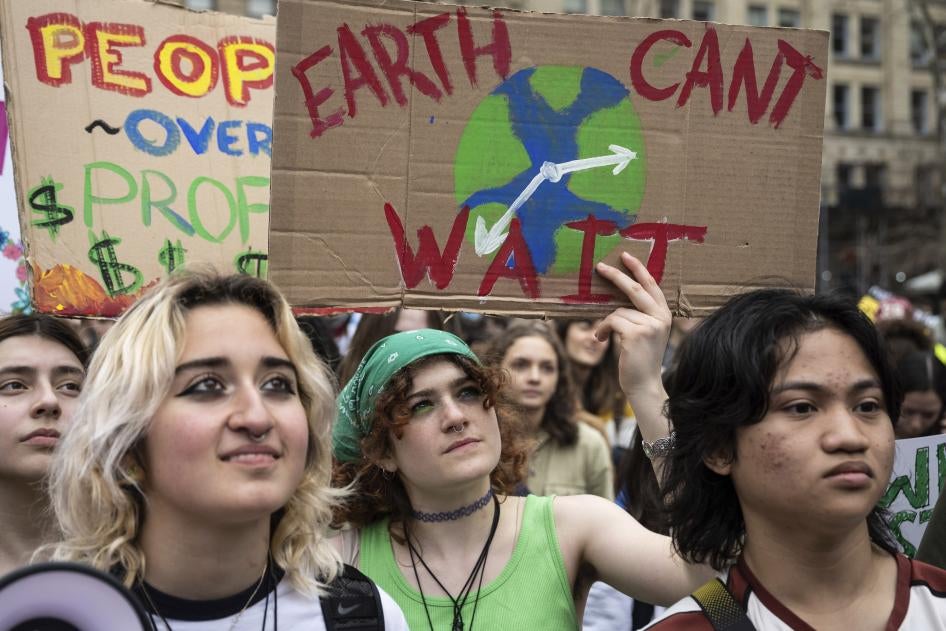High-Emitting Governments and Corporations Should Be Held Accountable
Rachel LaFortune
Researcher, Environment and Human Rights
"Fridays for Future" protests the climate crisis on Global Climate Strike day at a rally in New York, NY, on March 25, 2022.
© 2022 Gabriele Holtermann/Sipa via AP Images
This week, the world’s leading scientific body on climate change, the Intergovernmental Panel on Climate Change (IPCC), released a damning report that underscores the urgent need to hold high-emitting governments and corporations accountable for reducing greenhouse gas emissions as needed to prevent devastating climate harms.
United Nations Secretary General António Guterres did not mince words when announcing the report, calling it a “litany of broken climate promises” and a “file of shame.” When it comes to climate action, Guterres said, “Government and business leaders are saying one thing and doing another. Simply put they are lying, and the results will be catastrophic.”
The report, produced by over 278 authors from 65 countries, shows it is still possible to keep global warming to 1.5 degrees Celsius, as needed to prevent the worst outcomes of climate change. However, it will require “rapid and deep” emissions cuts across all sectors, and the current track record is not promising.
Average annual greenhouse gas emissions from 2010-2019 were higher than in any previous decade, with fossil fuels and industry responsible for the largest growth in emissions. Meanwhile, government commitments to reduce emissions are not ambitious enough, implementation efforts are falling even further behind what is needed, and financing for fossil fuels is still greater than for climate adaptation and mitigation.
If we do not see more ambitious climate action and a strengthening of policies beyond those implemented by the end of 2020, young people alive today are projected to experience catastrophic warming this century. As the report makes clear, globally we have the resources and means to achieve effective and equitable emissions reductions, including by transitioning away from fossil fuels to clean, renewable energy sources, ramping up energy-efficiency measures and widespread electrification, and protecting critical ecosystems. The report also makes clear that increased support from higher-emitting developed countries for lower-emitting developing countries is critical to equitably reducing emissions.
Yet all these measures require political will, and as Guterres noted, “High emitting governments and corporations are not just turning a blind eye, they are adding fuel to the flames.” Governments and corporations that continue to delay and defer needed climate action need to and may well be held accountable. As the IPCC notes, efforts to do so through courts are already underway and growing.
This week, the world’s leading scientific body on climate change, the Intergovernmental Panel on Climate Change (IPCC), released a damning report that underscores the urgent need to hold high-emitting governments and corporations accountable for reducing greenhouse gas emissions as needed to prevent devastating climate harms.
United Nations Secretary General António Guterres did not mince words when announcing the report, calling it a “litany of broken climate promises” and a “file of shame.” When it comes to climate action, Guterres said, “Government and business leaders are saying one thing and doing another. Simply put they are lying, and the results will be catastrophic.”
The report, produced by over 278 authors from 65 countries, shows it is still possible to keep global warming to 1.5 degrees Celsius, as needed to prevent the worst outcomes of climate change. However, it will require “rapid and deep” emissions cuts across all sectors, and the current track record is not promising.
Average annual greenhouse gas emissions from 2010-2019 were higher than in any previous decade, with fossil fuels and industry responsible for the largest growth in emissions. Meanwhile, government commitments to reduce emissions are not ambitious enough, implementation efforts are falling even further behind what is needed, and financing for fossil fuels is still greater than for climate adaptation and mitigation.
If we do not see more ambitious climate action and a strengthening of policies beyond those implemented by the end of 2020, young people alive today are projected to experience catastrophic warming this century. As the report makes clear, globally we have the resources and means to achieve effective and equitable emissions reductions, including by transitioning away from fossil fuels to clean, renewable energy sources, ramping up energy-efficiency measures and widespread electrification, and protecting critical ecosystems. The report also makes clear that increased support from higher-emitting developed countries for lower-emitting developing countries is critical to equitably reducing emissions.
Yet all these measures require political will, and as Guterres noted, “High emitting governments and corporations are not just turning a blind eye, they are adding fuel to the flames.” Governments and corporations that continue to delay and defer needed climate action need to and may well be held accountable. As the IPCC notes, efforts to do so through courts are already underway and growing.

No comments:
Post a Comment